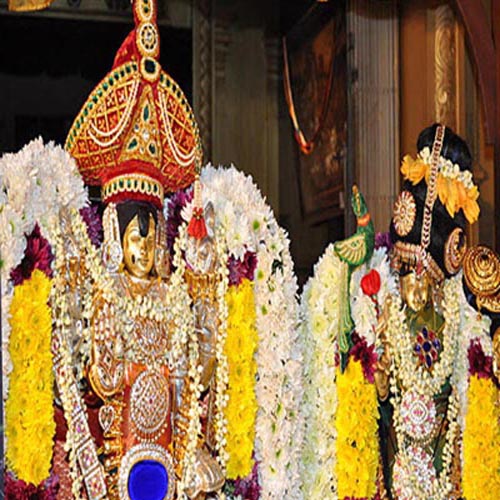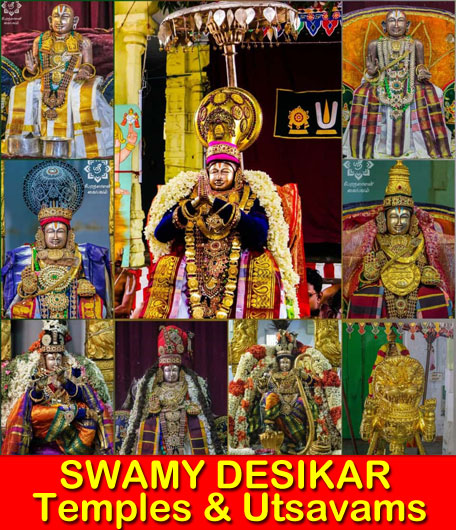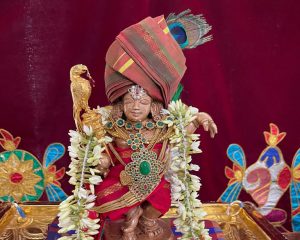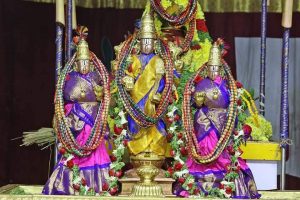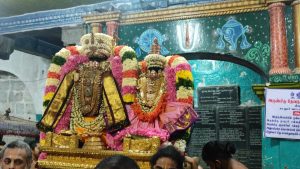Verses 16
Note: The girls have reached the house of the Lord and are now facing / talking to the sentry there.
Vayaal munam munam mAtradE amma
Meaning:
Do not keep giving excuse after excuse. Do not apriori refuse to consider our request (by giving some excuse, do not turn us away)
The girls have come thus far after observing all austerities as they should and now are asking for entry to see the Lord. The watchmen may not turn them away.
Likewise, when someone comes with an intent of getting (at) something with hope and effort, if we were in a position to pave their way forward (like the sentry here) we shall not discourage them or deny them their way forward whether we concur with them or not.
Verse 17
Note: Frankly the depth of the verse is something I could not relate to in the many discourses, discussions I have been exposed to.
To my limited understanding that I take pleasure in sharing….
This verse talks about Family.
Nandhahopan and yasodha the now parents of the Lord, are seen to represent the supreme Father and supreme mother (thayar and Perumal) and balaraman the Nlithya suris. We need to seek the Lord’s grace oy through the grace of Thayaar or sriLakshmi and through the acharyaas and the Nithyasuris
In a more mundane plane, when we reach out to or relate someone, we need to give due respect to his/her family, particularly to the elders. It is a universal practice to enquire about the wellbeing of all in the family and wish them well.
One is an integral part of one’s family and cannot be seen independently outside of his/her family. So it was (is) with Krishna.
Verses 18 to 20 Thirpavai – verses 18 to 20
These are a special set. They are dedicated to Napinnai. The name Napinnai is unique to the Tamizh ethos. It is an equivalent of the Radha tradition of the North. Experts opine they are the same person.
These 3 verses are dedicated to Napinnai to advocate the plea of the seekers as they surrender unto the Lord.
In the Srivaishnavite tradition the Lord is approached only through the supreme mother. It is called purushakaram. Please remember Kothai herself is bhooma Devi’s avathar. But in the human form as Kothai she looks up to Napinnai who is said to be neeladevi, a consort of SriVishnu.
Verse 18
In this verse Kothai and her friends entreat Nappinai to wake up and open the door of the house.
After the gurads had opend the gates, this is the next stop.
In management this is light heartedly and humorously referred to getting past the receptionist and then the secretary before reaching the CEO.
To reiterate, in a more spiritual orientation…
In the srivaishnavite tradition the Lord is approached only through the supreme mother. And her compassion is necessary for the process of surrender.
Verse 19
The devotees continue to approach Napinai.
In the last verse they implored her to open the door and in this they implore her to get the Lord open his eyes and see them and receive their song of surrender
We may be ready to offer our services, but what we offer must be accepted – and that through proper channel. The best of intentions and efforts must reach the goal sought. And that cannot happen without divine grace.
Verse 20
Ippode emmai neeratelor embhaavaai
Meaning:
Now, right now, may we be granted HIS grace.
The devotees continue to approach Napinai.
In the first verse they implored her to open the door and in the second they implore her to get the Lord open his eyes and see them and receive their song of surrender. In this, the third of this set and the 20th verse they implore that she recommends them to her consort, the Lord to immediately accept their surrender by invoking his pleasure
Verse 21
Core thoughts:
There are 3 thoughts to reflect upon.
One
Matraar vali thulaithu vandhu un Vassar kann adi pannindhaar pole
Potriyam vandom pugazhndelor embaavaai
There are 2 occasions when we surrender. One, when we are overpowered and lose out we surrender to the victorious as do kings in lost battles.
Two, when we surrender in love and devotion.
Here Kothai asserts that this surrender is of the second kind. Out of pure Love and devotion. No fear, no loss, no helplessness or battles either.
Two
This verse is dedicated to the Acharya and all the learned great ones.
The first 2 lines focus on this and have gained a lot of attention and importance in our ethos.
Etra kalanga l edhir pongi meedallika
Maatraadhe paal soriyum vallal perum.pasukkall……
The cows udder (without a change or pause) keep flowing, overflowing into the buckets….
This imagery is seen as the cows representing the Acharyas whose knowledge keep flowing because it is there and with no other expectation.
Three
Periyaai – ulaginil thotrammai ninrasudare…..
The lord is seen as the supreme Acharya whose effulgence created this world.
Margazhi 22 to 27
This set of verses are entreaties to the Lord while seeking his grace.
Verse 22
KiN kiNi vAi seidha thAmarai poo pOle
SengaN siri siridhe en mEl vizhiyAvO
Meaning:
Like the tingling of the Bells in an anklet
Please give your grace a little at a time
This is a sensitive prayer.
Not asking for windfalls only a little at a time – steadily, pleasantly – as pleasant as the jingle of anklets; which pleasant music is possible only because of the small slit in the Bell’s encasement.
Too large a slit, the bell will fall or be jarring, and if no slit there will be no music at all.
Verse 23
Yam vandha kariyam arraaindhu arullerlor embhaavaai
Meaning:
Please evaluate our requests with your discerning grace and grant us as you think best.
I may be focused on the short-term concerns out of short-sightedness or ignorance which may turn anti to my long-term requirements
Or may make mistakes in my requests as kumbhakarna made an error in pronunciation and asked for nidra instead of nitya
So, it is best to understand that the Lord knows best. May He evaluate our entreats and grant not what we want/ ask but what we need.
Verse 24
Enrenrum un sevagsme endhi paraikolvaan
Innru yaam vavdhom irangelor embhaavaai
Meaning:
Always at your service (oh! Lord) we have come unto you today. Please grant us your grace.
In this verse Kothai praises the Lord alluding to several incidences in Hindu mythology 6 times and then seeks his grace.
Verse 25
Varuthamum theerndhu magizhndhelor embaavaai
May our sorrows dissolve and joy abound.
This is a realistic strong prayer.
Absence of the negative is a prerequisite to the experiencing and enjoying the positive.
One may have a lot of wealth or power or loved ones around, but if he/she has an illness or a social or professional blemish or any other kind of negative, the wealth power etc., cannot be enjoyed. Likewise, one may be perfectly healthy and impeccably at peace with all around, but without enough wherewithal energies get diverted and dissipated to fill that gap.
May the negatives be dissolved and the positives must abound. So God bless us.
Verse 26
There are two thoughts embedded herein.
1. Melyaiaar seivana venduvana ketiyel
Meaning:
We request in prayer even as our elders/ ancestors have.
This relates to the importance of tradition and heuristics. Tradition must be carried on and heuristics taken advantage of.
What has been traditionally upheld must continue. We may not agree or think otherwise, that is our prerogative, but we have the responsibility of guarding and transferring to posterity the tradition that is theirs of which we are trustees. We have no right to cut the continuity of tradition.
Also, heuristics should not be underrated. Somebody has worked on it, experimented and succeeded. Why reinvent the wheel all over every time? Is it not prudent to take it forward with whatever fine-tuning (if and as required)?
2. Aalinillaiyaai arullelor embhaavaai
May that primordial source in which everything was precreation and which is in everything post-creation grace us with its benevolence
Verse 27
Core prayer
No prayer. No entreats. Just the joy of abundance and togetherness as a natural sequence of genuine prayer.
There are two thoughts to reflect on in this verse.
1. Celebrating abundance.
Aandaal and the Srivaishnava tradition that is hinged on SriLaksmi kadaksham or the benevolence of Srilakshmi, consort of the supreme Lord, SriVishnu, does not uphold relinquishing. What is to be relinquished is greed and ego – not joy.
….GOvindha undhanai paadi parai kondu yaam perum sanmaanam….
Meaning:
The reward of singing your praises, of praying to you Oh God….
(Is twofold)
1 pala kalanum yaam anivOm; aadaiudupOm, paal sOrum mooda, muzhangai nei vazhi vara. Koodi irundhu kiulirvOm.
We shall in all our finery, bedecked with jewels and fine clothes and with ghee flowing sweet rice enjoy the abundance of life with the Lord’s grace, as His prasad.
2. Koodaarai vellum seer Govinda
unnai paadi parIkondu yaam perum sanmaanam
……
……..
Koodi irundhu kulrdelor embhaavaai
The 27th day of Margazhi, the 9th month in the Tamizh calendar, is celebrated as a day for friendship and good will.
In this verse she says the reward we get for singing the praises of the Lord who wins over even those who differ, is that we celebrate togetherness.
May we live in harmony celebrating togetherness with abundance of life through HIs grace
Verse 28
Undhannai siru per azhaithanavum seeri arulaadhe
Iraiva nee thaarai paraiyelor embhaavaai
Meaning:
If out of enthusiasm, ignorance errors have crept in and they may be please be excused. Do not grace us with displeasure. Please give us your benevolent Grace.
The term, ‘seeri arulaadhe’ is of importance. We need to earn the pleasure of the lord even more than His grace and so Kothai says: “Please do not give us your grace with annoyance or displeasure.”
This is very important. If because we keep on asking, and just to get it done with, it is given, ‘thrown with disgust’, that does not serve the purpose. The entire process goes a waste and the effect of the Grace is lost. It is important how Grace or benevolence is given, not “thrown”
And so Kothai after seeking excuse for inadvertent errors of entreat out of enthusiasm or ignorance asks for benevolent Grace.
Verse 29
This is really the core of the entire 30 verses.
Four thoughts are embedded.
1. Kutreval engalai kollamal pogaadhu
We shall do as you bid us to. It cannot be otherwise.
2. The words
‘Engalai kollamal pogaadhu’ have also been interpreted as
You shall (somewhere, sometime) absorb us (into you.). It shall not be otherwise.
3. Undhanodu utremeyaavom, umakke naam aatcheivom
We belong to you and shall serve only you.
Mahakavi Bharathiar reiterates this thought in his lines
Bhhomiyil evarkum ini adimai seivyom
Parippoorananuke adimai seyidhu vaazhvom.
We shall not be slaves to anyone on this earth.
We shall live by serving only the almighty.
4. Matrai nam kaamangal matrelor embhaavaai
May our desires not turn towards anything else, except that we serve you.
(Oh! God, ensure that we have no other desire.)
This is perhaps the strongest thought.
My desires could get wavered and energies get diverted to and dissipated into (worthless) other things. I cannot control it except with the benevolent Grace of the Lord.
So, in supplicant surrender, I seek that the Lord may drive my volition to be focused only and only on the Lord.
Verse 30
Sengann thiru mugathu selva thirumaalaal
Engum thiruvarul petru inbhuruvar embhaavaai.
With the Grace of the Almighty Lord, may pervasive joy prevail.
In conclusion:
I have attempted to share the core thoughts and prayers embedded in Thiruppavai.
Thiruppavai is the central text in the Bhakti orientations of Srivaishnavism and is considered the quintessence of the Vedas. However, I have avoided all allusions to Hindu mythology or the Hindu Pantheon (by and large) I have attempted to highlight only such core thoughts that are both classical and universal, valid across time and geographies and as well as religious orientations.
May the oneness of the universal Consciousness prevail over all the variances of our individual consciousness.
Ms. Padmini Janardhanan


